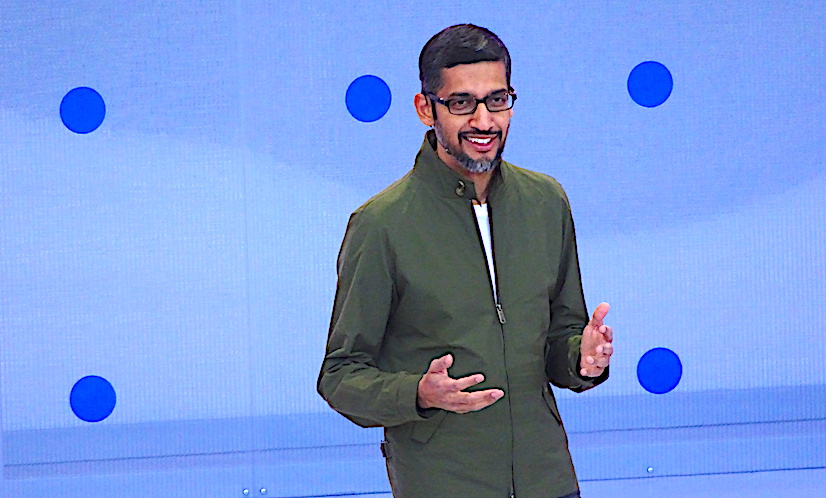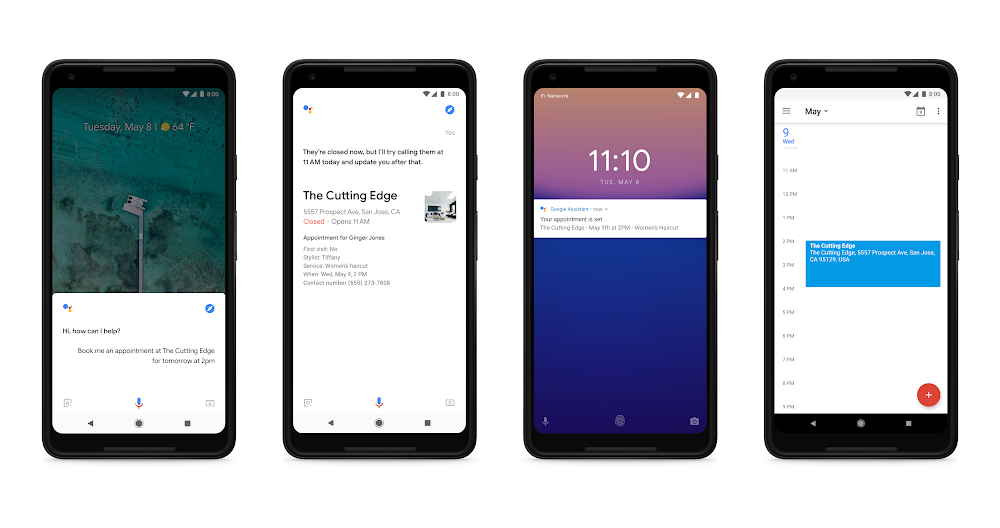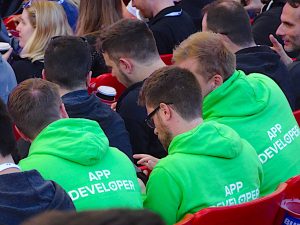 EMERGING TECH
EMERGING TECH
 EMERGING TECH
EMERGING TECH
 EMERGING TECH
EMERGING TECH
If there was any remaining doubt that Google Inc. is doubling down on its bid to spread the benefits of artificial intelligence into every nook and cranny of business and everyday life, the company quashed them flat today.
In its signature announcement at its annual Google I/O conference for software developers near its Silicon Valley headquarters, the technology giant introduced the beta test version of its latest Android P operating system, which won’t roll out on Google’s Pixel and other leading-edge phones until late summer. It has lots of AI-driven new features such as the ability to predict the next action a user might want to take and a feature that sets time limits on certain apps to promote “well-being.”
Other new features include Adaptive Battery, developed with Google’s DeepMind AI unit, which prioritizes battery power for the apps and services used the most to save power, and Adaptive Brightness, which uses machine learning to save more power by anticipating how you like to set screen levels in different lighting environments. “Android P is an important first tack toward this idea of AI at the core of experiences,” said Dave Burke, vice president of engineering for Android.
Google Maps is also getting some fancy new features such as navigation that uses the camera to make it easier to find your way than with flat maps using GPS, a feature that drews oohs and ahs from the audience. And Gmail has a new Smart Compose feature that builds upon a previously released Smart Reply to provides extended suggestions in emails as you type. Another crowd-pleaser: Google Lens, an app introduced last year to enable people to point a phone at something and get information on it, is now moving into camera apps, enabling things such as taking a photo of a document from any angle and getting a clean PDF from it and browsing the real world to get real-time info from what the phone’s seeing.
The company also announced some other whizzy new features for its Google Assistant voice service, including new voices such as singer John Legend’s, the ability to ask questions with multiple subjects, and “Continued Conversation,” which eliminates the need to keep saying “Hey Google” to trigger it in a series of requests.
In the same vein, a new capability called Google Duplex enables more natural conversation with Assistant. Google even demonstrated Assistant itself calling to make reservations at a salon and a restaurant with shockingly natural-sounding responses, complete with “ums,” that sounded even more human than some people you might know.

Making a phone call with Assistant using Google Duplex (Image: Google)
Google unveiled those announcements and more, some of which are available now and others rolling out in coming weeks and months, at I/O, held at Shoreline Amphitheatre near its headquarters in Mountain View, California.
All of them, if it’s not obvious already, are enabled by AI and machine learning, the method of enabling computers to learn rather than having to be explicitly programmed, to accomplish services ranging from image and speech recognition to self-driving cars. In short, if the keynote by Chief Executive Sundar Pichai and his top executives were a drinking game with AI as the operative word, everyone in the amphitheater would have been unconscious on the cement well before the end.
Indeed, Pichai took the opportunity at Google’s biggest conference of the year to hammer home his messaging of the past couple of years: AI is the key enabler of just about every new technology product and service. His pitch is that Google can provide all the tools needed by companies looking to leverage it in their businesses — and that the thousands of developers gathered here and watching the conference online are the key to creating the applications to do that.
“There’s a huge opportunity for AI to transform many fields,” Pichai noted. He went on to provide an example Google has cited before about using machine learning to improve the diagnosis of diabetic retinopathy, but researchers also used AI to figure out that certain patterns on the retina could predict heart problems such as stroke. That kind of thing wasn’t apparent to human doctors or researchers.
Pichai’s AI focus was a rerun of sorts from his message last year, but now the rest of the tech industry has joined in, providing a lot more competition for both products and talent. Last week, Facebook Inc. CEO Mark Zuckerberg also emphasized the importance of AI, and this week at Microsoft Corp. Build developer conference, CEO Satya Nadella also focused on AI as a key thread to many of the company’s products.

Developers at Google I/O
More specifically, Pichai emphasized Google’s goal of making AI and machine learning more accessible to many more people, not just experts. One path the company also announced today was the launch of ML Kit, a new set of programming interfaces that can run on multiple kinds of devices to enable developers to incorporate Google’s text recognition, face detection, image labeling and other machine learning technologies.
Google also unveiled the third generation of its Tensor Processing Unit, the sets of chips it created that are tuned to run the deep learning algorithms used in the AI-driven services. It’s so powerful, Pichai said, that “we’ve had to introduce liquid cooling in our data centers for the first time.”
Yet another small step Google took Monday in the direction of remaking itself into an “AI-first” company: It dispensed with its Google Research group name, unifying all its research efforts under a “Google AI” moniker and website.
At the same time, Pichai today addressed what’s on the mind of everyone from Silicon Valley to Middle America to Washington D.C.: the responsibility of tech companies to address problems of data breaches, technology addiction and manipulation of their platforms by bad actors from hackers to countries such as Russia seeking to influence election results in nefarious ways.
“We’re at an important inflection point in computing,” he said. “It’s clear that technology can be a positive force and improve the quality of life for billions of people around the world. But it’s equally clear that … there are very real and important questions being raised about the impact of technology and the role it will play in our lives. We know the path ahead needs to be navigated carefully and deliberately — and we feel a deep sense of responsibility to get this right.”
He mentioned what sounded like a new Google mission statement, which was originally “to organize the world’s information and make it universally accessible and useful.” Pichai added the phrase “beneficial to society,” though it’s not clear if that’s brand-new.
In any case, the means to do that should be obvious by now: “AI is enabling us to to do this in new ways,” he said.

Google AI chief Jeff Dean
Jeff Dean, the Google Brain project co-founder who currently leads Google.ai, Google’s AI division, said in a later presentation that the company continues to evolve its AI efforts, in particular aiming to make AI systems more flexible so they can handle more than narrowly defined tasks. “In the future, you’ll see us move toward models that can do many, many things,” he said. Besides being more efficient in the use of data, he added, they’ll have more “common-sense reasoning about the world because of their experience.”
The company is working to avoid inherent bias from systems that learn from biased data and working on the same kind of safety protocols that traditional “hand-coded” systems have, he said. And not least, it’s working to shed light on the “black box” nature of machine learning systems so they can explain how they came to particular decisions.
Support our mission to keep content open and free by engaging with theCUBE community. Join theCUBE’s Alumni Trust Network, where technology leaders connect, share intelligence and create opportunities.
Founded by tech visionaries John Furrier and Dave Vellante, SiliconANGLE Media has built a dynamic ecosystem of industry-leading digital media brands that reach 15+ million elite tech professionals. Our new proprietary theCUBE AI Video Cloud is breaking ground in audience interaction, leveraging theCUBEai.com neural network to help technology companies make data-driven decisions and stay at the forefront of industry conversations.